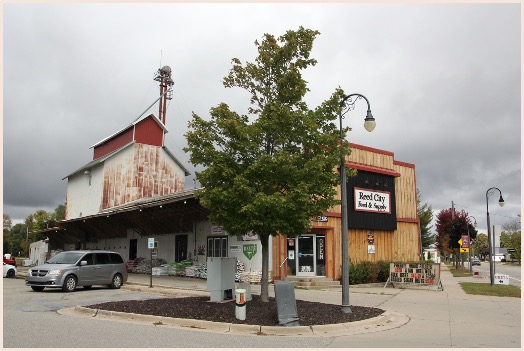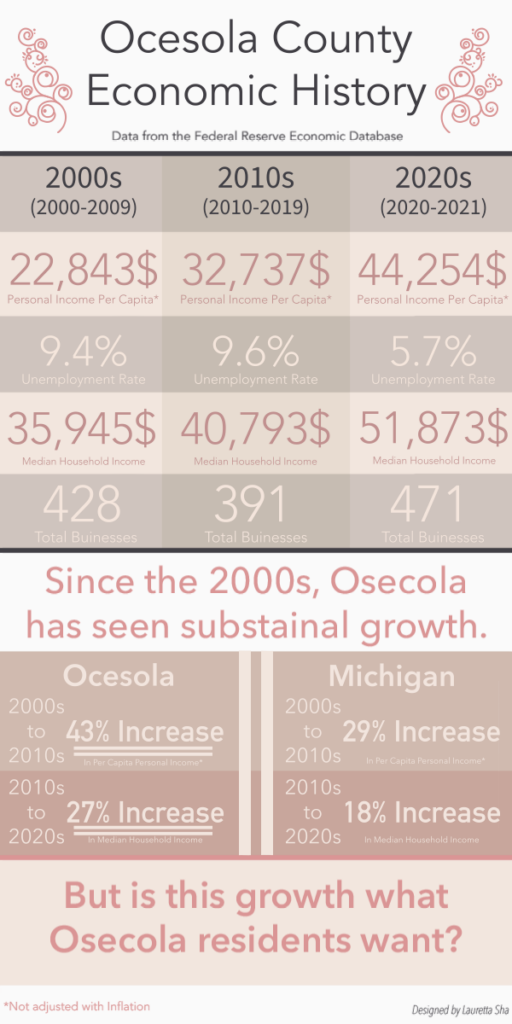A Boost for Small Business in Osceola County, Michigan

Set in the middle of Michigan’s lower peninsula, Osceola County’s economy has consistently lagged the rest of the state for decades. However, with a focus on local growth and businesses, residents hope the 2020s may be a decade of improvement for the Working Class Country community.
Since joining a regional partnership, the Middle Michigan Development Corporation in September 2022, the county’s priorities have shifted toward local economic development.
“Through the work that we do at MMDC, our hope is to elevate all that Osceola County has to offer, while ensuring companies that are committed to our communities have the resources they need to succeed,” MMDC Vice President Kati Mora said.
Osceola partnered with the MMDC — which has assisted rural counties in developing and expanding their communities since 1981 — following the retirement of the county’s Community Development Director Dan Massy.
Under their contract with Osceola, the MMDC has aided those in the county with company expansion projects and referrals to Osceola’s Small Business Development Center, participated in a Rural Childcare Innovation Program, and held a Developer’s Day in Evart.
 Following this partnership, county data from the Federal Reserve Bank of St. Louis has shown a significant improvement in the number of businesses, potentially hinting at closing gaps between county and statewide economic data.
Following this partnership, county data from the Federal Reserve Bank of St. Louis has shown a significant improvement in the number of businesses, potentially hinting at closing gaps between county and statewide economic data.
Osceola entered the 2000s at a peak number of businesses — 468 in late 2000 and early 2001, a record-high for the county. By the next decade of the 21st century, however, the county’s average number of businesses dropped by 10% as stores and restaurants shuttered. A record low of 376 businesses came 15 years after its peak.
While the county saw a slight recovery from its 2016 low over the next five years, Osceola’s number of businesses has dramatically increased within the past year.
Following the MMDC-county partnership, the number of businesses grew from 413 in 2022 to 449 in 2023, an 8% increase. In September of this year, Osceola renewed its contract with the MMDC, which included “conducting a Business Retention and Expansion program,” according to the county’s website.
“MMDC set an initial goal of establishing a baseline with area companies and we’ve done just that,” Mora said. “As we’ve been meeting with companies across the county, we’ve gotten a better sense of the challenges they face and their successes.”
One of those challenges: drawing customers. Osceola is sparsely populated, with only about 23,000 residents across its 560 square miles.
So Reed City has implemented various new attractions in an attempt to increase visitor rates and improve the community’s general interest. In recent years, they’ve installed a free disc golf course, created a mountain bike course, and collaborated with the social district.
“That’s brought in a lot of people from in-town and out of town,” said Reed City Brewing Company co-owner Courtney Murphy. “And definitely has given our city something to do on the weekends. We’ve had concerts, cornhole tournaments, painting the sidewalks. The city has really stepped it up since Covid-19.”
Generating business in an area as small as Reed City, the family-owned company says they’ve done well in their six years of business, thanking not only their regulars, but also a stream of tourists.
“We get a lot of people from in town and the surrounding areas, but we also get a lot of traffic flow incoming from all over the state of Michigan, Indiana, Illinois,” Murphy said. “We attract a different crowd than most stores or restaurants in the area.”
“We see a lot of repeat customers — it’s not just random people here, random people there.” Murphy said. “We build a strong connection with all of our customers, and I honestly don’t think we could do that in a larger city.”
Reed City Brewing Co. was founded in 2017, three years before the onset of Covid-19. Murphy believes the community was brought even closer by Covid-19, highlighting how the city government has increased their development efforts post-pandemic.
“Definitely within the last couple of years — after Covid-19 for sure — it’s been more of helping each business in the community grow and strive to do their very best,” Murphy said. “We get a ton of support for all the business we do in Reed City, a ton of support.”
Under the renewed contract, Mora said the MMDC will continue to focus on business retention and growth, business attraction and community development, and economy-boosting events.
In addition to increasing the overall number of businesses in the county, the MMDC’s efforts have also positively impacted established shops and restaurants in the community.
With this economic improvement in Osceola, even non-local companies are drawn to the county, establishing brick-and-mortars in the developing business community.
“It has been incredible to see how much growth has occurred since graduating from Reed City High School back in 2002,” Mora said. “When Ebels General Store decided to put their second location in Reed City just a few years ago, that really served as an economic catalyst for growth. Now they have their third location in Evart, and many other new businesses have launched around the area.”
With the MMDC’s efforts to grow Osceola’s economy, residents can already observe the revitalization of businesses in their county. One big sign of change: employment in the county. The unemployment rate in the county for 2022 was only 4.7%, nearly rebounding to the pre-Covid level of 4.1% in 2019, which was the lowest figure on record in 30 years.
This is part of a series of posts from students at the Michigan State University Journalism School. The students will be covering four counties around Michigan during the 2024 campaign for the Detroit Free Press working with the American Communities Project typology.